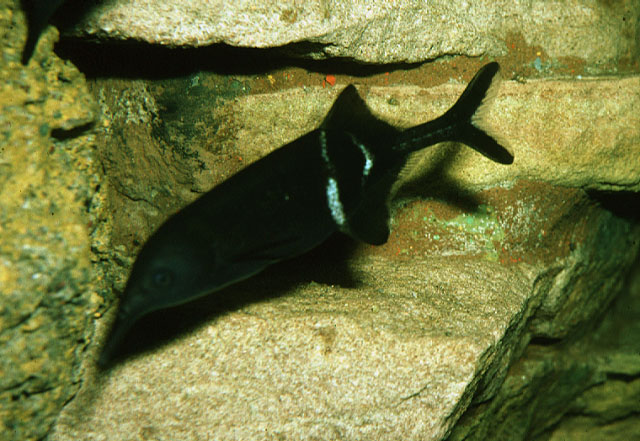| Mormyridae (Elephantfishes) |
| 35 cm SL (male/unsexed) |
|
demersal; freshwater; pH range: 6 - 8; dH range: 5 - 19 |
| Africa: Niger to Congo River basins (Ref. 3203). Widespread in the Congo basin (Ref. 1878, 4910, 11970, 41580, 41591, 106245, 106290). Also reported from Lake Tanganyika (Ref. 114071). Report from the Cuanza in Angola (Ref. 99599) unconfirmed in Ref. 120641. Reports from Lake Kivu are erroneous (Ref. 46152, 107916). |
|
Dorsal spines (total): 0-0; Dorsal soft rays (total): 25-31; Anal spines: 0-0; Anal soft rays: 32-36 |
| Occurs close to the bottom where it probes for food with the long snout. Territorial and usually aggressive towards members of its own species. This behavior has been shown to involve electric organ discharge (EOD) activity (Ref. 10011). Feeds mostly at night on worms and insects (Ref. 7020), probably aided by electro-sensory inputs (Ref. 10011). Electroreceptors are distributed over the entire head, the dorsal and ventral regions of the body, but absent from the side and the caudal peduncle where the electric organ is located (Ref. 10011). Sex-related EOD characteristics in this species has been demonstrated in the laboratory with freshly imported samples during the breeding season; such EOD dimorphism changed with time in captivity (Ref. 10764; 10766). Lead nitrate in water significantly increased EOD rate and selectively altered the EOD waveform of this species (Ref. 10469). Dubbed a `hearing specialist' having auditory abilities in the range of 100-2500 Hz, with `best frequencies' between 300 and 600 Hz (Ref. 10830). Aquarium keeping: in groups of 5 or more individuals; minimum aquarium size 150 cm; not recommended for home aquariums (Ref. 51539). |
|
Least Concern (LC); Date assessed: 03 September 2019 Ref. (130435)
|
| harmless |
Source and more info: www.fishbase.org. For personal, classroom, and other internal use only. Not for publication.

